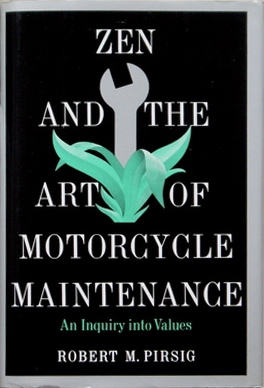 This Sunday the New York Times had a very interesting article by a former knowledge worker with a number of degrees switching profession to become a motorcycle mechanic. There is a lot to be said about following your passion, and that is clearly what the author Matthew B. Crawford did. He felt restricted in his cubicle jobs and stimulated both mentally and physically by being a motorcycle mechanic.
This Sunday the New York Times had a very interesting article by a former knowledge worker with a number of degrees switching profession to become a motorcycle mechanic. There is a lot to be said about following your passion, and that is clearly what the author Matthew B. Crawford did. He felt restricted in his cubicle jobs and stimulated both mentally and physically by being a motorcycle mechanic.But I find that his thesis, at least as it pertains to his own example, is highly over-simplified. His general point is that for many people desk jobs are bad and physical labor jobs are a better fit. I don't necessarily disagree with that, but his path is a highly unusual one. First off, he had a number of liberal arts degrees, including a Ph.D. in political philosophy from the University of Chicago. He is quite a bit different from a kid who barely passed through high school and who is taking careers courses.
Also for a time and for a time worked at a terrible job cranking out abstracts for magazines articles, some of which already had abstracts written and many of which in specialized fields that he had no knowledge off. He mentions a co-worker who admitted to sometimes being smacked out on the job. Also, he didn't leap head-first into a mechanic job, he had worked in auto shops as a young man, it's not like he did one Habitat build and then started his own home repair firm.
To step back a bit, let's make a little comparison:
Job Path 1: Meaningless job writing abstracts -> motorcycle mechanic
Job Path 2: Google programmer -> ditch digger
Both of these transitions are from mental to physical labor, but the transitions could not be more different. Motorcycle mechanics and being a Google programmer both require high levels of thinking -- just read Zen and the Art of Motorcycle Maintenance if you want an alternate to confirming this by getting your hands dirty. The transition from mental to physical worked for him largely because of his background and personal passion for motorcycles.
Crawford spent years and years in high education writing papers, which is an important and valid way of processing information, but it's not problem solving. It's clear from reading the article that Crawford is the kind of person who gets off on problem solving, a lot of folks do including myself, and there are a variety of fields that allow for it.
For better or worse political philosophy is not an area of study where you get the satisfaction of definitively solving a problem that would come from say, Computer Science. And that's the main reason I personally stuck with computer science, it wasn't the ambiance of the promise of untold millions, (the internet economy had already pretty much crashed and burned by the time I took my first CS college course), it was immense satisfaction of knowing that you had solved a problem.
All that said, Crawford is right to defend manual labor. It is something that largely can't be outsourced, each trade craft has it's own skill set, and there is a great satisfaction in seeing the actual product of your labor at the end of the day. I just think he should have save some money and avoided getting that Ph.D.




2 comments:
I do not like to solve problems. What career is for me?
I am interested in learning basics of repairing motorcycle. I do not want to do online classes. Please suggest me any place from where I can get proper training of motorcycle mechanic.
Post a Comment